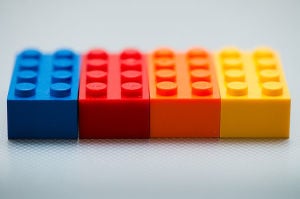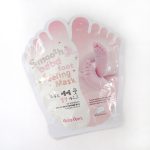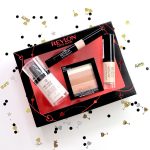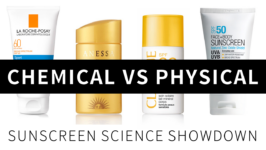Plastic is unavoidable in modern society, and unfortunately the vast majority of the plastic products we use will long outlive us. While we can (and should) recycle a lot of our plastic waste, microplastics (including microbeads) are a form of plastic that is difficult to dispose of thoughtfully.
What is microplastic?
Simply put, microplastic consists of bits of plastic – usually defined as less than 1 mm wide. Because these particles are very small, they’re often not completely filtered out by sewage treatment and make their way into the environment, and in particular the sea.
Where does it come from?
Microplastics come from a range of sources:
– Bits breaking off larger plastic objects
– Fibres coming loose from synthetic materials in washing machines
– Personal care and cleaning products, such as face scrubs containing scrubbing beads or microbeads (usually listed in the ingredients as “polyethylene“)
What’s the worry?
There’s a lot of it, it’s everywhere, and it’s not going to go away. Scientists have only recently realised how widespread microplastic is, so the research on its effects has only really just begun. But it’s already been established that lots of marine animals low on the food chain, such as shellfish and worms, that are used to eating microscopic organisms end up eating microplastics. These end up in their tissue, and these eventually pass up to larger animals (e.g. fish and seals).
As well as the physical effects of eating plastic, there’s also a worry that these plastics can carry toxic chemicals – many toxins are attracted to plastics rather than water, and so the toxins end up concentrated on the little particles, and can move through the food chain that way.
What can we do?
Even though the impact of our exfoliating scrubs on the environment isn’t clear at this stage, there’s no harm in trying to reduce how much plastic we wash straight down the sink, when there are so many easily accessible alternatives!
There are many scrubs on the market which use ground nuts, jojoba beads, flowers and other natural, biodegradable materials instead of plastic (although many “natural” products contain microplastics anyway – check the ingredients!).
Plus you can always mix your own environmentally friendly scrub – add salt, sugar, sand or ground oatmeal to your cleanser (see this DIY face scrub for example!), or use a facecloth or exfoliating brush for non-disposable scrubbing action.
Unilever (makers of brands such as Dove, Vaseline, Lux, Radox and St Ives) announced late last year that they plan to phase out microplastics in their products by 2015. It’s likely that other companies will follow suit, so microplastic-based scrubs will hopefully be soon be a thing of the past!
References
Discover Magazine – Phasing out polluting plastics
MA Browne et al., Accumulations of microplastic on shorelines worldwide: sources and sinks. Environmental Science & Technology, 2011, 41, 9175.
Proceedings of the GESAMP Workshop on Microplastic particles (2010)







Oh noes! I’ve been using micro plastic scrubs for years! Now I feel bad. I’ll be finding a new scrub next time I go to the shops. 🙂
Me too! The particles are nice and even, but I’m just not comfortable flushing them into the ocean.
On the issue of natural scrubs, I recommend ground azuki/adzuki beans. The Body Shop used to sell them; when they stopped, I was heartbroken! Eventually I worked out how to make my own – you can buy dried azuki beans in health food stores, and then grind them in a coffee grinder or spice mill until the pieces average around 1-2mm.
Tip them into a dry bottle and keep them in the shower; to use them, just tip a small pile of dry ground beans into your palm, mix with a few drops of water until it’s a stiff paste, and gently scrub. It’s so nice for your skin – I found nothing else has ever left it so soft and smooth. There’s something that comes out of the beans when they get wet that really helps soften the skin, too.
They sound great. I usually have them at home (yay Asian foodie parents) but we ran out, I’ll have to try it soon!
Thanks for the awesome informative post! Just went to check my face scrub to see if it contains microplastics! I couldn’t see “polyethylene” in the ingredients but it is St Ives so maybe they’ve phased it out already? I dunno! Anyway I like the idea of a natural scrub using oatmeal so I’m keen to give that a go!
I think most St Ives scrubs use ground up kernel of some sort – some people think it’s too harsh for the face, but if it works for you then that’s great 🙂 You might find oatmeal a bit weak after using something on the rougher end of the scale though!
OMG, not only I feel guilty for taking the pill and polluting the environment with my hormone-laden urine that now I also have to feel guilty about using scrubs…Anyways, from now on I’ll try to choose exfoliating products that have ground seeds or jojoba pearls, thanks for the info!
I haven’t researched it extensively, but from what I know oral contraceptives are a relatively insignificant contribution to estrogen in water, compared to things like dairy farming 🙂
i never knew about this! very informative!
Glad you found it useful!
A very informative post! Thank you for the useful info. Nice share!
I didn’t realize that removing the microfibers could be so beneficial. I recently started purchasing new skin care products. To be honest I don’t know if they have microfibers but, I know they said they were environmentally friendly. I will have to look more into it. Thanks for sharing.
This is scary! If Unilever has some microplastic content in some of its products, it is very possible too that women’s pads and tampons have the same content. Good thing I’ve started using menstrual cups which are guaranteed free from any harmful chemical.
I didn’t even realize that there could be bits of plastic not being completely filtered out by sewage treatments. I haven’t really used exfoliating face scrubs in the past, and I’ll definitely be careful about using them in the future. I want to prevent as much plastic from entering the sewage systems as possible. Thanks for the information.
HI,
I really don’t know like this, this is very informative post, thanks for share this
Hey!
This post seems to be very interesting and informative too.
I agree o your words.
I must say that these Microbeads is really polluting this natural habitat of the wildlife also.
And these particles are drained into water bodies such as lakes and oceans and due to their resilient chemical bonds, they remain unchanged in water. This will pollute the water.
And to eliminate this from this natural environment the best way is just banned the plastic or polythene bags which are available in the market.
Or everyone should hire a waste collection companies that will helps you reduce the wasteland dispose it in proper way .
Thanks a lot for sharing your great ideas.
Thumbs Up, to your blog Buddy !
God Bless U!
So many things to discover about plastics! Thanks for the information!